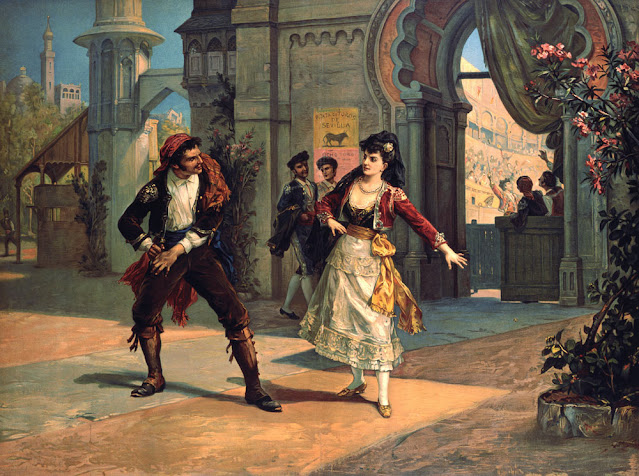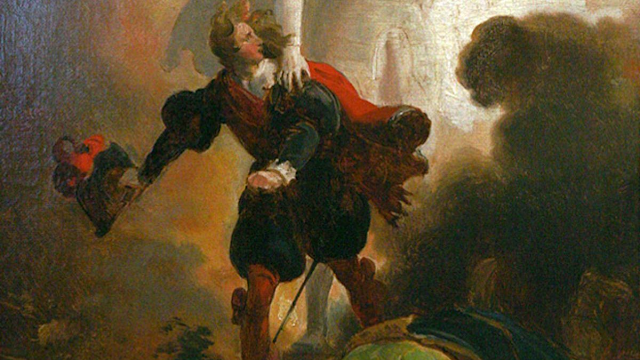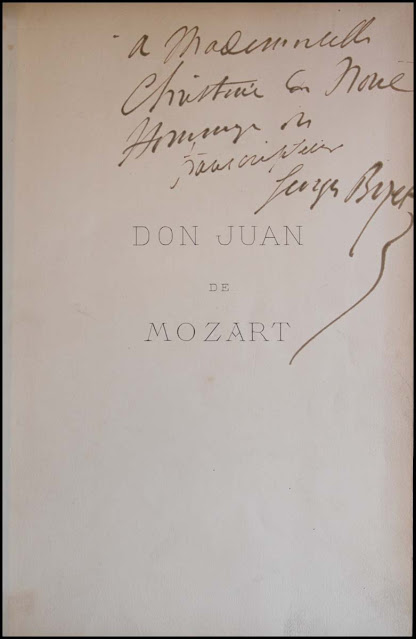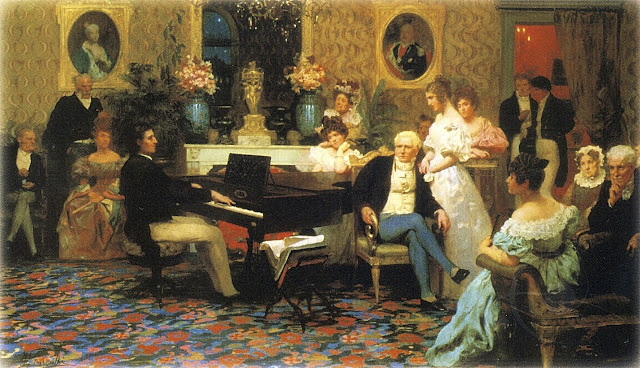'And such sweet girls - I mean , such graceful ladies' (Don Juan, Canto II/V, Byron) - Cyprien Katsaris performs the rare Mozart Don Juan solo piano transcription by Bizet
 |
Don Juan and Zerlina (British Library) |
 |
| NIFCCD 141-142 |
 |
| A scene from Bizet's opera Carmen |
A degree of vertigo overwhelms me when I begin to consider the kaleidoscopic life of Lorenzo da Ponte (1749-1838). He was the speedy Mozart librettist of Le nozze di Figaro (1786); Don Giovanni (1787) and Così fan tutte (1789). Constant unexpected reversals of fortune in his life led to massive changes of plan that plagued this intense improviser on life's stage. The insanely disconnected and illogical events of his long-lived destiny are introduced piecemeal into the opera plot.
Da Ponte became immensely successful as a result of the libretto for the opera A Rare Thing (1786) by Vicente Martín y Soler (1754-1806), one of the great musical successes of the time, comfortably outdoing Mozart in Vienna despite the success of Figaro.
He wrote in his Memoires: 'We might have had more amorous adventures than all the Knights of the Round Table in twenty years .... Invitations for walks, lunches, suppers, jaunts in the country, fishing parties; billets-doux, little gifts accompanied by enigmatic verses - it simply did not stop!'
 |
| A British cartoon (1791) satirizing rival opera impresarios (from 'The Librettist of Venice’ Robert Bolt) |
In 1787 Da Ponte was offered three projects : Salieri's Axur and Martín's The Abor of Diana, both of which would be more successful than the third, Don Giovanni. This seemed an impossible workload to accept but the indefatigable librettist recalled: 'At night I shall write for Mozzart [sic] and imagine I am reading Dante's Inferno. In the morning I shall write for Martini, and feel as if I am studying Petrarch. In the evening it will be Salieri's turn, and that shall be my Tasso.' Despite his present fame, he spent little time on the libretto of Mozart's opera.
Da Ponte reminisced that on his bureau he supplied himself with a good bottle of Hungarian Tokay wine placed on his right, coffee and tobacco from Seville, adequate amounts of caffeine and nicotine, a brimming inkwell conveniently in the middle of the desk and a box of excellent snuff on his left. This was aesthetically completed by the sensual and distracting attentions of a young girl of sixteen, who materialized at the ring of his bell (often rung) to bring him coffee, sweet treats and inspiration with the added benefits of '...amorous dallying at which she was a perfect mistress.'
The Don Giovanni story was familiar, even ubiquitous, in the Europe of the day, even to the point of cliché. Da Ponte's own colourful, erotic lifestyle drew him inexorably to Il dissoluto punito, ossia il Don Giovanni. His own multifarious failed projects assisted him to create the analogous abject failures of Giovanni as he moves inevitably to his doom - despite his impressive record of international conquests recounted by Leporello. He tells us he insisted on introducing opera buffa comic elements to the composer (a dramma giocoso) to guarantee public success. Mozart wanted to produce a deeply serious opera, albeit from rather low-class origins. Even so it is hardly a scarcely a comic tale as every conquest is frustrated. 'Europe and the world,' he wrote, remembering his time as Mozart’s librettist in Vienna, 'largely owe this magnificent genius’s exquisite compositions to my perseverance and conviction.'
Mozart was much loved in Prague. The opera was premiered after several delays at the National on 29th October 1787. He and Constanze spent much time at the Villa Betramka owned by his old fried, the Czech soprano Josepha Duschek, as did on occasion Da Ponte and Casanova.
A visitor observed succinct vignettes of them all:
'Mozart anticipated the day of the premiere as though it were a carnival. He paid extravagant curt to the ladies, played all kinds of tricks, talked in rhyme ....and everyone let him do anything he wanted to as if he were a child. Da Ponte had 'quicksilver movements and the dark, fiery southern eyes...' He paired well with Casanova as both appeared insufferably vain speaking of the honours they received from great men they had impressed.
Mozart was small in physical size and had an unusual face but was able to 'cast a spell on any woman with his eyes'. The haunting Overture, full of foreboding in the demonic key of D minor, was not the usual sparkling opera buffa opening. The overture is surely one of the most threatening in the prescient atmosphere of pure evil ever created in music. Moreover, it was written the evening before (Mozart often wrote best at the last minute!) with no time for rehearsal, the opera conducted by Mozart himself. A cloud of damnation is suspended like a heavy, over-heated tropical atmosphere soaking into the fiber of the entire work, working downwards relentlessly to the Don's final damnation in flames.
Well, this is not an essay solely on Mozart and his masterpiece! Apart from being set in Spain, whatever drew Georges Bizet to the labour of transcribing the entire opera (less the recitatives) for the solo piano ? I knew nothing of this extraordinary phenomenon until this recent Cyprien Katsaris astonishing recording for the NIFC, Warsaw.
 |
| Georges Bizet around the time of the Don Giovanni transcription circa. 1860 |
When Georges Bizet was in his late twenties he made a remarkable arrangement of Mozart's great opera Don Giovanni. This extraordinary work gives a strong indication of his musical direction, structure and melodic ideas in writing Carmen. In the Paris of the 1860s, Bizet was struggling to arrange the staging of his works even though as a brilliant musician he was a Prix de Rome laureate in 1857.
The Pecheurs
de perles (The Pearl Fishers) had been rather unsuccessfully staged at the Theatre
Lyrique in 1863. Bizet was in need of funds. Although he was a fine
pianist he did not play as part of a serious professional career as a concert artist. His unjustly neglected keyboard and
orchestral compositions were largely ignored. His musical journey seemed in
paralysis and he was forced to earn his living mainly by arranging and
transcribing the music of other composers. This Don Giovanni work was woefully designated a 'transcription for
hire' by the music publisher Heugel in 1866.
'This
story about a manipulative and exploitative woman places Carmen in the category
of the classic battle of the sexes. The most formidable other operatic
treatment of this battle is Mozart's famous libertine, Don Giovanni. Carmen and
Don Giovanni are both operas that take place in Seville and deal with an
archetypal main character; both stories center around sex and seduction; both
stories were initially considered immoral by their public; both characters
exercise their power to manipulate the opposite sex for no apparent reason
other than their own pleasure; and both leading characters are finally
entrapped by their deeds with their deaths the final consequence of their
actions.' (Burton D. Fisher, Carmen,
2007)
Carmen was his final opera, delayed in production because of fears that its themes of betrayal and murder would offend audiences. After its premiere on 3 March 1875, Bizet was convinced that the work was a failure; he died of a heart attack three months later, unaware that it would prove one of the most popular of all operas, a spectacular and enduring success. His early death was a tragic loss to French music. Much was given away or lost on his death but the surviving compositions are enjoying a contemporary resuscitation. His love, understanding and even emulation of Mozart is clear from this transcription.
I cannot imagine a pianist more suited to performing this work than the charismatic, extrovert and personality-rich, Cyprien Katsaris.
We are all familiar in 2023 with the plot of the opera Don Giovanni from countless recordings and performances. Familiar, renowned arias make up the bulk of this two CD set To hear the music without the words or theatrical action on stage is a unique treat. One can concentrate on the extraordinary genius Mozart had for infectious melodies. Katsaris makes much of this feature. Our imagination of scenes and characters is aroused unhindered by staging. We can render the opera as personally as we might wish! So many aspects of the travails and contradictions of love, the 'moving toy-shop of the heart', are depicted here - affection, rage, jealously, heartbreak, revenge, sensuality, passion, deception, murder, rape, mendacity, betrayal, eroticism, loyalty, lyricism ....
The Bizet Don Giovanni is a remarkably spirited and artistic transcription, far beyond transcriptions by other renowned composers of famous works. It is idiomatically pianistic (perhaps as a result of Bizet's own brilliant keyboard talents), full-blooded, energetic and lyrical from the opening ominous, doom-laden overture which so surprised the audiences of the day.
The humour contained in the Leporello Air du catalogue. Madamina, il catalogo è questo, Katsaris elicits with entertaining panache. Sheer energy pervades the Duo et Choeur Giovanetti che fate all'amore of Zerlina, Mazetto and the Choir. Katsaris cleverly communicates the insidious, insinuating, insincere yet seductive nature Don Giovanni towards Zerlina in the Duo Là ci darem la mano. Again the melody of the Air Fin c'han dal vino is wildly exuberant and incontrovertibly opera buffa. The Air Batti, batti o bel Masetto, becomes an authentic a plea for redemption expressed though the regretful feeling of being a 'guilty cheater'. This aria creates a curious contemporary ambivalence in our world of changing cultural mores.
The long Finale to Act 1 at Trio des Masques Presto, presto. Protegga il gusto cielo. Andante maestoso. Ecco il birbo che t'ha affesa! (Zelina, Donna Anna, Donna Elvira, Don Ottavio, Don Giovanni, Leporello, Mazetto and Choir) is eloquent of character tensions and rich in polyphony which Katsaris fully exploits. We recall in the inner mind of unbridled, unlimited imagination, a personal imagery created through the filter of personal experience. I was often moved emotionally and entertained in turn as I listened by say the Trio Ah taci ingiusto core (Donna Elvira, Don Giovanni and Leporello). Especially affecting and so effective reduced to the solo piano was the Air Vedrai carino sung by Zerlina. Of course Mozart wanted theatrical and financial success and the Sérénade Deh! Vieni alla finestra sung by Don Giovanni with the irresistibly comic mandolin is popular yet moving in its insincerity.
And so Katsaris takes us unresisting and delighted through the remainder of the opera to the lugubrious and fatalistic dinner with death, that ominous knocking at the door of mortality by the 'ghost' of the Commendatore. My imagination moved into extra high gear in an inturned, self-centred yet intensely creative manner in this transformation, uniquely lacking the external stimulation of voice, words or scenery. Bizet achieves in his transcription of the final scenes a dark, passionate eloquence with a substantial degree of horror as Don Giovanni inescapably on this occasion faces death, judgement, eternal punishment and condemnation as he is dragged down to eternal fiery damnation. Don Giovanni cries through the music Che inferno ! che terror! I thought Katsaris excelled in communicating the energy of resistance, the external human struggle against inevitable fate and the atmospheric sense of hell marvellously well in his performance of this remarkable transcription.
This unique recording by Cyprien Katsaris of a unique and rarely heard transcription by Georges Bizet for solo piano of arguably the most famous Mozart opera is a thought-provoking and musical revelation. Highly recommended.
 |
| Don Juan et la statue du commandeur (c. 1830) Alexandre-Evariste Fragonard |






Comments
Post a Comment